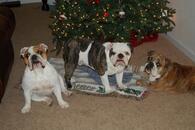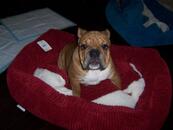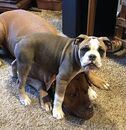I found this article on Bloat on my e-mail this morning,
Think You Know What Causes Dog Bloat? You Might Be Surprised…
Dog bloat is scary. You feed your dog and bam, the worse thing imaginable happens. Unfortunately, it’s not something that is talked about until after you’ve had an experience of your own.
The AKC Canine Health Foundation (CHF) wants to change this and is currently conducting research on the subject, to better understand the causes, thus saving more lives. Dr. Shila Nordone, Chief Scientific Officer of the AKC CHF answered a few questions for us on the subject.
Are only large dogs at risk for bloat?
No, while it is most commonly seen in larger, deep-chested dogs it is not restricted to dogs of a particular breed or size. Mixed breed dogs can bloat. Veterinarians do see bloat more commonly in certain deep-chested breeds such as Great Danes, Standard Poodles, German Shepherds and Collies.
Contrary to public belief, new studies are showing that feeding habits DO NOT contribute to bloat risk.
What feeding habits make the risk for bloat greatest?
There is no scientific evidence that feeding habits increase a dog’s risk for bloat. Older epidemiological studies suggested there was a relationship between feeding practices – the height at which the food bowl was placed, the size of the dog kibble, exercise before or after eating, large amounts of water intake before or after a meal or exercise – but there is no scientific evidence that there is ‘cause and effect’ and this was anecdotal evidence at best.
There is more solid evidence that stress or anxiety (such as during separation from an owner) may increase risk in dogs physiologically predisposed to bloat. But again, until we understand the pathophysiology of bloat (the early physiological changes that initiate bloat and torsion) this is anecdotal evidence at best.
Does what you feed your dog (dry, wet, raw, etc) make a difference in risk factor?
No, there is not scientific evidence that form of dog food is a risk factor for bloat. In general beware of “Dr. Google” when seeking information about your dog’s health. It is fine to read what is out there, but then talk to your veterinarian about your dog’s healthcare and treatment. They have the training, expertise and experience to provide you with valid recommendations. Veterinarians understand the evidence-based practice of medicine and can explain the difference between anecdotal evidence and scientific evidence.
What are the best habits to reduce the risk?
Work with your veterinarian when your dog is A YOUNG ADULT to determine whether prophylactic gastropexy surgery is warranted. This conversation should happen when you are discussing spay/neuter. Your veterinarian will be able to evaluate your dog’s body conformation, behavior, and make solid recommendations. Prophylactic gastropexy surgery does not prevent the stomach from becoming gassy, but rather the torsion of the stomach that causes the stomach to twist. Torsion results in the pinching of blood vessels that cut off blood supply to the tissue. The end result is tissue damage and necrosis, which is ultimately what kills dogs when they bloat.
What are the signs and/or symptoms of bloat?
Agitation and distress (because the dog is in pain)
Retching with foamy saliva that suggests unproductive vomiting
Later stage symptoms include:
Pale gums
Rapid, labored breathing
Collapse – all of which suggest the dog has entered systemic shock
What should an owner do if they suspect bloat?
Immediately seek emergency veterinary treatment. Always have your emergency veterinarian’s number on hand, call ahead to tell them you are on your way and that you suspect your dog has bloated. A team of critical care specialists will be prepared when you arrive. Every minute counts.
What is the treatment and prognosis?
Treatment is surgery to repair the torsion and release the pressure, and remove necrotic (dead) tissue to restore blood flow to the GI tract. Prognosis without surgery is grim, with most dogs not surviving. Prognosis with surgery is not great; survival is 10%-30% depending on how quickly the dog was helped.
Tell us about the research you are doing right now.
We have some exciting research funded to address many of the unanswered questions regarding canine bloat. Our funded researchers are the foremost experts in this field and include Drs. Claire Sharp and Elizabeth Rozanski at Tufts College of Veterinary Medicine, and Dr. Laura Nelson at Michigan State University College of Veterinary Medicine. When the AKC Canine Health Foundation funds research we are not looking for incremental gains in knowledge, we are looking for research that will impact the lives of dogs. The work at Tufts is being done in collaboration with Nestlé Purina PetCare and The Broad Institute of MIT and Harvard, bringing an exciting convergence of expertise across animal and human health to tackle this problem. The Broad is a powerhouse of genetics and bioinformatics research, one of the best in the country. And having an animal health company involved will accelerate the transition of research from the lab to real life products that can improve the health of dogs. These studies are designed to determine the molecular mechanisms of disease; whether there is a genetic predisposition to disease (as there is evidence that bloat occurs more frequently in some familial lines than others), and whether abnormalities in the stomach’s ability to contract might predispose dogs to bloat. This work is ongoing and we expect preliminary results within 2 years.
Resources for Concerned Dog Lovers
The AKC CHF has educational resources available for dog owners right now, including a free webinar for dog owners explaining bloat.
For veterinarians, they have a free webinar showing them how to perform prophylactic gastropexy surgery hosted by VetVine, a veterinary continuing education group. The gastropexy surgery webinar is approved for continuing education credit. Both were done by Dr. Rozanski of Tufts, so it is information both dog owners and veterinarians can trust.
About the Author
Based in Wilsonville, Ore., animal lover Kristina N. Lotz is a Certified Professional Dog Trainer – Knowledge Assessed (CPDT-KA) and works as a full time trainer. She is the founder of A Fairytail House, a unique all-positive all-sport dog training facility that helps rescue dogs in her area and provides free seminars and training classes for the community. In her spare time, she trains and competes in herding, agility, obedience, rally, and conformation with her Shetland Sheepdogs. She smartly married a Veterinary Technician, who helps keep the fur kids happy and healthy, and provides a quick resource for articles.
Think You Know What Causes Dog Bloat? You Might Be Surprised…
Dog bloat is scary. You feed your dog and bam, the worse thing imaginable happens. Unfortunately, it’s not something that is talked about until after you’ve had an experience of your own.
The AKC Canine Health Foundation (CHF) wants to change this and is currently conducting research on the subject, to better understand the causes, thus saving more lives. Dr. Shila Nordone, Chief Scientific Officer of the AKC CHF answered a few questions for us on the subject.
Are only large dogs at risk for bloat?
No, while it is most commonly seen in larger, deep-chested dogs it is not restricted to dogs of a particular breed or size. Mixed breed dogs can bloat. Veterinarians do see bloat more commonly in certain deep-chested breeds such as Great Danes, Standard Poodles, German Shepherds and Collies.
Contrary to public belief, new studies are showing that feeding habits DO NOT contribute to bloat risk.
What feeding habits make the risk for bloat greatest?
There is no scientific evidence that feeding habits increase a dog’s risk for bloat. Older epidemiological studies suggested there was a relationship between feeding practices – the height at which the food bowl was placed, the size of the dog kibble, exercise before or after eating, large amounts of water intake before or after a meal or exercise – but there is no scientific evidence that there is ‘cause and effect’ and this was anecdotal evidence at best.
There is more solid evidence that stress or anxiety (such as during separation from an owner) may increase risk in dogs physiologically predisposed to bloat. But again, until we understand the pathophysiology of bloat (the early physiological changes that initiate bloat and torsion) this is anecdotal evidence at best.
Does what you feed your dog (dry, wet, raw, etc) make a difference in risk factor?
No, there is not scientific evidence that form of dog food is a risk factor for bloat. In general beware of “Dr. Google” when seeking information about your dog’s health. It is fine to read what is out there, but then talk to your veterinarian about your dog’s healthcare and treatment. They have the training, expertise and experience to provide you with valid recommendations. Veterinarians understand the evidence-based practice of medicine and can explain the difference between anecdotal evidence and scientific evidence.
What are the best habits to reduce the risk?
Work with your veterinarian when your dog is A YOUNG ADULT to determine whether prophylactic gastropexy surgery is warranted. This conversation should happen when you are discussing spay/neuter. Your veterinarian will be able to evaluate your dog’s body conformation, behavior, and make solid recommendations. Prophylactic gastropexy surgery does not prevent the stomach from becoming gassy, but rather the torsion of the stomach that causes the stomach to twist. Torsion results in the pinching of blood vessels that cut off blood supply to the tissue. The end result is tissue damage and necrosis, which is ultimately what kills dogs when they bloat.
What are the signs and/or symptoms of bloat?
Agitation and distress (because the dog is in pain)
Retching with foamy saliva that suggests unproductive vomiting
Later stage symptoms include:
Pale gums
Rapid, labored breathing
Collapse – all of which suggest the dog has entered systemic shock
What should an owner do if they suspect bloat?
Immediately seek emergency veterinary treatment. Always have your emergency veterinarian’s number on hand, call ahead to tell them you are on your way and that you suspect your dog has bloated. A team of critical care specialists will be prepared when you arrive. Every minute counts.
What is the treatment and prognosis?
Treatment is surgery to repair the torsion and release the pressure, and remove necrotic (dead) tissue to restore blood flow to the GI tract. Prognosis without surgery is grim, with most dogs not surviving. Prognosis with surgery is not great; survival is 10%-30% depending on how quickly the dog was helped.
Tell us about the research you are doing right now.
We have some exciting research funded to address many of the unanswered questions regarding canine bloat. Our funded researchers are the foremost experts in this field and include Drs. Claire Sharp and Elizabeth Rozanski at Tufts College of Veterinary Medicine, and Dr. Laura Nelson at Michigan State University College of Veterinary Medicine. When the AKC Canine Health Foundation funds research we are not looking for incremental gains in knowledge, we are looking for research that will impact the lives of dogs. The work at Tufts is being done in collaboration with Nestlé Purina PetCare and The Broad Institute of MIT and Harvard, bringing an exciting convergence of expertise across animal and human health to tackle this problem. The Broad is a powerhouse of genetics and bioinformatics research, one of the best in the country. And having an animal health company involved will accelerate the transition of research from the lab to real life products that can improve the health of dogs. These studies are designed to determine the molecular mechanisms of disease; whether there is a genetic predisposition to disease (as there is evidence that bloat occurs more frequently in some familial lines than others), and whether abnormalities in the stomach’s ability to contract might predispose dogs to bloat. This work is ongoing and we expect preliminary results within 2 years.
Resources for Concerned Dog Lovers
The AKC CHF has educational resources available for dog owners right now, including a free webinar for dog owners explaining bloat.
For veterinarians, they have a free webinar showing them how to perform prophylactic gastropexy surgery hosted by VetVine, a veterinary continuing education group. The gastropexy surgery webinar is approved for continuing education credit. Both were done by Dr. Rozanski of Tufts, so it is information both dog owners and veterinarians can trust.
About the Author
Based in Wilsonville, Ore., animal lover Kristina N. Lotz is a Certified Professional Dog Trainer – Knowledge Assessed (CPDT-KA) and works as a full time trainer. She is the founder of A Fairytail House, a unique all-positive all-sport dog training facility that helps rescue dogs in her area and provides free seminars and training classes for the community. In her spare time, she trains and competes in herding, agility, obedience, rally, and conformation with her Shetland Sheepdogs. She smartly married a Veterinary Technician, who helps keep the fur kids happy and healthy, and provides a quick resource for articles.




